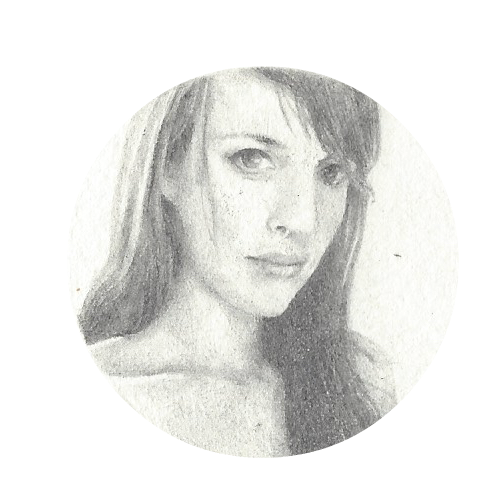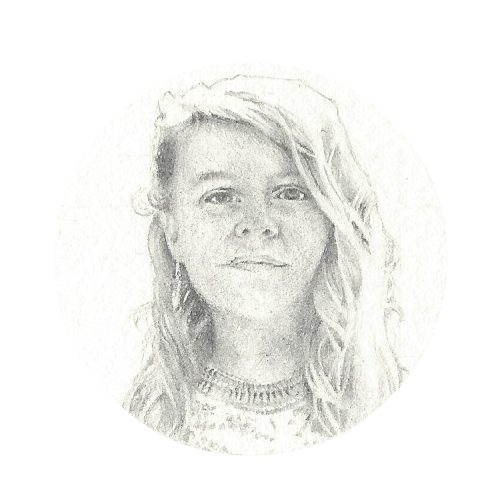ON WATER
by Madeleine Barnes
images by Bibi Baker-Prideaux
And now the day, raft that breaks up, comes on.
I think of a few bones
Floating on a river at night,
The starlight blowing in a place on the water,
The river leaning like a wave towards the emptiness.
–Galway Kinnell
Star formation is largely responsible for the presence of water on earth. I learn this as I become the sickest I have ever been. A cloud of doctors forms above my bed. They listen to my stomach with a stethoscope, press down hard, monitor my breathing. They speak in rapid Spanish. They sit me up to take my blood pressure, check my tongue for dehydration, and search my nasal cavities for blood. One doctor reminds me of my friend Rafa, kind and direct with his questions. Bryn translates. He tells the doctor that I haven’t been able to keep the smallest sips of water down for almost 12 hours now, and it’s been 5 days since the first symptoms. They discuss the shivering. Escalofríos, the doctor calls it. The word rings through my limbs in bright shocks as I try to sit still.
*
The medical drama House is playing on the hotel TV in Spanish. I watch scenes of bodies in agony. I suddenly remember the death of my beloved art teacher. At the time I couldn’t face it. A terrible knowledge turns in my stomach: it could happen to me too. There’s not enough oxygen, not enough drinking water, and no doctor from home can help me here. Everything smells sulfuric. I think of the ocean, imagining a massive wave carrying me away. In childhood I swam at the neighborhood pool often. Once I almost drowned. I could feel the air pulling from my chest and I kicked hard to ascend faster. A girl I knew in elementary school, Rona, who drew beautiful pictures of mermaids, drowned in the deep end of that pool. I remember watching her color tiny shells and cascading green hair.
*
One night during our stay at this hotel, the water cooler runs out and no one can find staff to replace it. The concierge is absent. There’s no other source of safe drinking water within miles. The cooler stands unattended to in the dark lobby. Its hollow body radiates an air of panic. Something essential is scarce. Before morning, I wake up to the sound of a man pounding his fist on the clear blue tank. “Why?!” He shouts. “Where is it?!”
*
The deep end of the pool had a tunnel that connected water from the main pool to the diving pool. You could swim down and look through the hole and wave to a friend on the other side, or simply go down alone. It wasn’t possible to swim through it, but you could have a look at another world while the surface shimmered above. This is how being sick in a foreign country feels. I tunnel down through the depths of flashing stars, fighting off the most visceral thoughts of death. I wait for wave after wave of sickness to pass, all the while clutching a cold water bottle in one hand. I read the Spanish label intently. Even though I know I’ll vomit it right back up, I take a sip, hoping to absorb one or two drops. It’s worth it. I tell Bryn that when I’m better, I’m going to drink three bottles of water without a thought. I realize how much I love water, how necessary it is to earth, and what a privilege it is to drink potable water all the time.
A doctor writes down prescriptions and instructions. His card says that he studied medicine in Cuba. He gives Bryn directions to the pharmacy. Both of them turn to look at me, silent. Nothing like fearful concern in the eyes of someone you love. Deep blue flash. I try to keep more water down, try to get warm.
*
Band 5 ALMA Receiver is an instrument used to detect water in the local universe. It observes radio waves invisible to the human eye. It captures the weak electromagnetic glow emitted from space with 66 antennae. I visualize this object to fight off fear. I can feel my ribs, wrists, and shoulders sharpening. I can feel my body becoming invisible as it loses even more water. The European South Observatory’s Gianni Marconi says in an article about ALMA, “The study of water is, of course, of intense interest because of its role in the origin of life.”
The hotel walls are thin. You can hear everything that happens in the room above you. From the bathroom, I listen to people have sex, brush their teeth, floss, or ask for the Wi-Fi password. Life continues even though my body is doing something violent and uncontrollable. A whisper comes through the bathroom vent: “Miss, are you okay?” I pause, considering the possibility of hallucination. I softly whisper back: “Hello?” No response.
I crawl into bed and pull the space heater closer; this helps with chills but makes my mouth dry and face hot. I curl up in the shower to vomit again. It goes on like this for hours until finally people begin setting up the hotel breakfast. I dream of each breakfast item: a pot of coffee, cups for tea, bread, orange juice, green apples. 30 minutes later, I wake up gasping for air.
*
I remember the feeling of being hit by a water balloon when I was a kid, how good it felt to have the cold splash against my sunburned skin—I remember biting a hole in one and drinking from it. I remember green apples and oranges. Simple, perfect, hydrating. I consider sneaking out of the room in my pajamas to look for the breakfast line to find one apple, but I can barely roll onto my side.
Sulfuric water is supposed to be okay in small quantities. I think I remember this from grade school. I revisit the boiling points of water. In these mountains it boils much faster. Bryn says warm water passes through the body quickly, so I shouldn’t bother heating it up.
*
When we hiked the Inca trail earlier in the trip, Andy told us that some bromeliads survive because they are able to store water in a structure formed by their overlapping leaf-bases. They are often self-sustaining. I find a tree full of them, their red spines stretching out into the pitch of the mountains. I am not exactly self-sustaining—I can’t keep my water down, and rely on those around me for diagnoses, translations, and medical advice. At this point, I can't imagine what it would be like to have most of what sustains you built into you. I want to hold what I am meant to hold.
*
Star formation is accompanied by an outward wind of dust and gas. It is this outflow of material that impacts the surrounding gas and creates shock waves. The waves compress and heat the gas, and this produces water.
“Wake me up for anything. If you need water, food, or even if you’re just lonely, promise me you’ll wake me up,” Bryn says. I want him to sleep and avoid getting sick too. I can swim to the top. I can go out and search for the apple on the 4th floor. It floats in the dark by the window.
*
I remember being sick like this once as a child. My relatives brought me hundreds of books to read. I was home from school for weeks. One afternoon my mother entered the room, put her cool hand on my sharp, bony hip, and began to cry.
On a different occasion, she was rushed to the hospital in the middle of the night and when I asked my father why, he said she was dehydrated.
*
I can live like this for a little longer. I stare into the blue bottle in my fist that will, like the maps in the New York City subway cars, go on existing without me. When I cry there are no tears. Water is awe and consolation. It cleans, it refuses to resist, it cycles. I am preparing to dive off the high board, dreaming of aquatic life forms and human civilization. There was Mesopotamia, between the rivers Tigris and Euphrates. The Nile. Rome’s Tiber. I have to get home to Pittsburgh and find where the Ohio, Allegheny, and Monongahela Rivers meet. I think of the bridges built to span water, ports, ships, sailboats, and the prom night on the Gateway Clipper boat. Deep sea also occurs to me, its depths even more terrifying than space.
I want to tell Bryn it’s likely that water exists in other galaxies because hydrogen and oxygen are two of the universe’s most abundant elements. Water vapor has been detected in the following atmospheres: the Sun, Mercury, Venus, Earth, Mars, Ceres, Jupiter, Saturn, Uranus, and Neptune. Whatever comes after this will be paradise. Water, the source of life, will save me. It will save others, and it will also kill them.
Soon I’m able to stand and gently take off one sweatshirt without vomiting. I tiptoe across the room, shivering less. It will take three planes to get us home, but for the first time I can visualize leaving the hotel. I peek through the curtain, searching for the water cooler below. It’s full. The stunned, uncountable stars above the city draw closer, dipping low to scoop me up.
Notes:
Information about Band 5 ALMA Receiver comes from an article by Richard Hook on the European Southern Observatory’s Website (eso.org), published on July 17, 2015.
The epigraph is from Galway Kinnell’s poem titled “Poem of Night” from the collection Poems of Night, Rapp & Carroll (London, England), 1968.
Madeleine Barnes is a writer and visual artist from Pittsburgh, PA. She is the author of the chapbook The Mark My Body Draws in Light, and her work has appeared in places like Pleiades, BOXCAR Poetry Review, Rogue Agent, Fields Magazine, YEW Journal, Jai-Alai Magazine, and The Rattling Wall. She is the recipient of a New York State Summer Writers Institute Fellowship, an Academy of American Poets Poetry Prize, and the Three Rivers Review Poetry Prize. She holds an M.Phil from Trinity College Dublin and an MFA in Creative Writing from New York University, and she was named an emerging watch by the Poetry Ireland Introductions Series.
madeleinebarnes.com
I am deeply connected to my film camera. I play with light, bridging the miracles and mysteries of the the human canvas with the cosmos and natural world, by way of the enchanting film photography portal, both in front of and behind the lens. I am also a wordsmith. Writing strikes me like lightning. I must dance her dance when the call has been made, channeling and crafting from a pure space of astral magic. I would love to celebrate life with you via @kiss_the_night.






